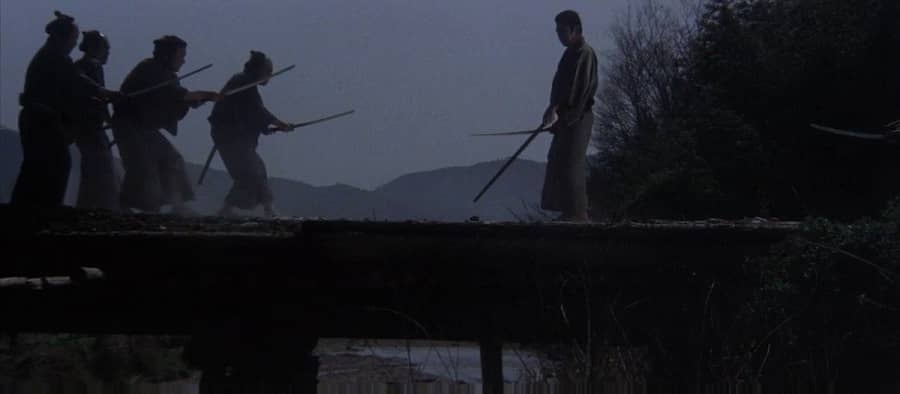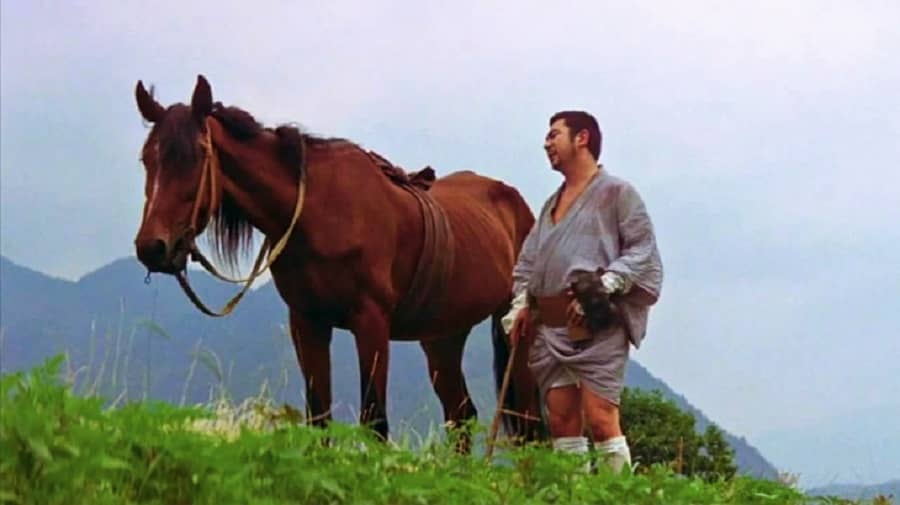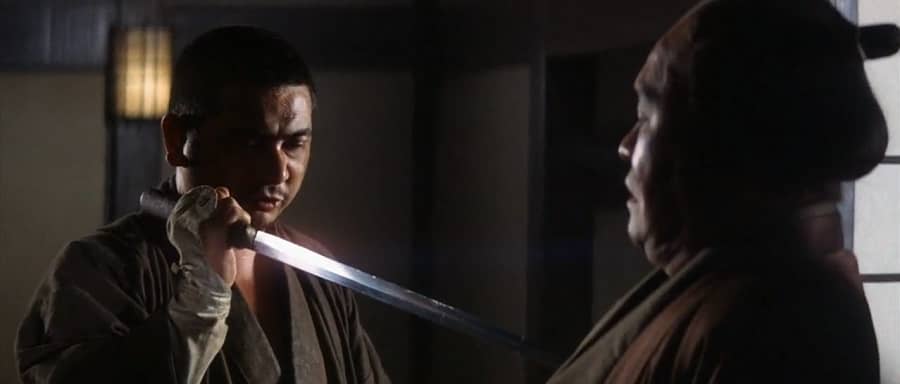Ellsworth’s Cinema of Swords: Zatoichi’s Finest
Zatoichi’s Vengeance (Japan, 1966)
The Zatoichi films, a chambara series that features Shintaro Katsu as a blind yakuza swordsman, was very popular in Japan, running throughout the Sixties and totaling 19 films in quick succession, followed less rapidly by a final half-dozen “special” entries. Though the films in the series tend to follow a familiar formula, they are successful because the elements of that formula are a rich mixture of suspense, pathos, action, comedy, and wistful romance. Katsu’s Zatoichi is a blind masseur at the lowest level of Shogunate Japan’s social hierarchy, but he deeply resents the abuse he suffers from his social betters, and his preternaturally keen senses enable him to develop the skills of a sleight-of-hand gambler and, more importantly, a lightning-fast swordsman. A master of iaijutsu, or the slash on the draw, Ichi holds his blade in a reverse grip that is lethally effective when he gets inside the guard of those wielding longer katanas. He also has a lightning wit that enables him to suss out plots and conspiracies from a few overheard clues. Best of all, though he has a temper, Ichi is inherently good-hearted and always comes to the aid of the vulnerable suffering at the hands of their abusers.
Remarkably, of the 19 films in the initial series, every one of them is worth watching. But some are better than others, of course, and the series hit a peak in late 1966 and early 1967 with its thirteenth, fourteenth, and fifteenth entries. If you can spare the time to watch only three films from the series, these are the ones to pick. Let’s take a look.
Zatoichi’s Vengeance
Rating: *****
Origin: Japan, 1966
Director: Tokuzo Tanaka
Source: Criterion DVD
Another top-of-the-line entry, with an exemplary script by Hajime Takaiwa and lovely direction by Tokuzo Tanaka, who returns to the series after a three-year absence. Korube (Shigeru Amachi), a down-on-his-luck samurai, kills a fugitive from the yakuza for a few gold ryo; Zatoichi (Shintaro Katsu) stumbles upon the murder scene, cuts down the goons who are looting the dying man, and then speaks to him. The man’s name is Tamekichi, he gives Ichi a purse of money for someone named Taichi, and dies.
A dying request is a thing Zatoichi can never turn down. He takes the purse, and in the next town he happens upon Taichi, a young boy being raised by Tamekichi’s aging mother. The formerly peaceful town is being terrorized by Boss Gonzo (Kei Sato), whose gang is running a protection racket extorting payments from every business; only a few are still holding out. Everywhere he turns, Zatoichi finds people who need help, but the only help he has to give is killing. The voice of his conscience — in this case, a blind, biwa-playing priest — tells him he must restrain himself because his example is corrupting others, especially young Taichi. What to do?
Ichi tries to earn money as a masseur and is hired by a prostitute, Ocho (Mayumi Ogawa, in an affecting performance), who is haunted by a secret sorrow and is drinking herself into oblivion. Her sorrow is that she fell for the samurai Kurobe, who turned out to be unworthy of her love, and after he abandoned her, she turned to prostitution. However, now he returns, pledging to make amends, but Ocho rejects him. Kurobe learns that he can buy out her debt to the brothel for 50 ryo. That’s a lot of money, and the only way he can earn it is from Boss Gonzo, who will pay him that sum to kill Zatoichi, thus removing the obstacle to his protection racket.
Moral dilemmas on every side! Unfortunately for Ichi, he really does have only the solution of the sword, so when Gonzo’s gang comes for Taichi’s grandmother, the blade is once more drawn. A running battle with the yakuza leads to a final fight on a bridge, a melee shot entirely in silhouette against the predawn light. It’s gorgeous. The goons try to deafen Zatoichi with thunder drums from the village festival, but he finds the strength to defeat them anyway. However, the battle isn’t over: Kurobe arrives to challenge him so he can win the money to free Ocho, and they meet at dawn on a beach of shining pebbles.
The ending, as usual, is bittersweet, but it’s entirely justified by the preceding events. And Zatoichi wanders on to yet another town without even taking his leave.
Zatoichi’s Pilgrimage
Rating: *****
Origin: Japan, 1966
Director: Kazuo Ikehiro
Source: Criterion DVD
Zatoichi (Shintaro Katsu) feels remorse for killing all those yakuza goons in the first thirteen films; inside he doesn’t feel like a killer, so in atonement he sets out on a pilgrimage to eighty-eight temples, vowing to kill no more. Making his way across the idyllic Japanese countryside he is dogged by an armed man on a horse, who eventually confronts him with drawn sword on a long bridge. He names himself as Eigoro, attacks suddenly, and Ichi kills him. So much for his vow.
In an affecting sequence, the horse paws at its dead master, then begins to follow Zatoichi as the blind swordsman continues his journey. Ichi is concerned, but it gets worse when they reach a fork in the road and the horse insists that he take the horse’s route. Now Ichi is following the horse; eventually it leads him to its home stable, and a young woman comes out. Ichi asks if she’s a relative of Eigoro, she senses that Ichi’s killed him, grabs a sword and slashes him in the arm. He could have dodged, but he felt moved not to move.
This protracted opening is as effective as it is unusual, but now the story moves to familiar territory. Eigoro had owed money to a gang boss, Tohachi (Isao Yamagata), but Tohachi saw Eigoro as an obstacle to his taking over Eigoro’s village, so to cancel the debt he’d sent him to kill Zatoichi, assuming the notorious swordsman would instead kill him. With Eigoro out of the way, Tohachi thinks he can expand his territory safely, but he hasn’t counted on Zatoichi’s growing friendship with Eigoro’s sister, Okichi (Michiyo Okusu). When Tohachi arrives to announce that he’s now in charge and Okichi must marry him, she introduces him to her new guardian Zatoichi, and the whole playing field is changed.
Though in the end it deals with familiar themes, this film is a change of pace for Zatoichi, or at least a change of pacing; the story is given time to unfold gradually, and there are a lot of wide, lingering shots of lush summer farmland that are a refreshing contrast to the series’ usual nighttime alleys and smoky gambling dens. The gangsters all ride horses, galloping across the countryside, and instead of a cowardly bully, Boss Tohachi is a confident conqueror who’s also a dead shot with a horse bow. Tohachi is the most dangerous yakuza chief Zatoichi has faced yet, and Yamagata’s performance is memorable, recalling that of Eli Wallach as Calvera in The Magnificent Seven.
It all leads to a showdown in the streets of Okichi’s village, where the smiling headman has decided that the villagers’ best chance lies in doing nothing and letting Zatoichi face Tohachi and his goons alone. And at first, no one comes to his aid, Tohachi’s tactics are effective, and Zatoichi has to fight with increasing desperation just to stay alive. The direction is just grand, and the ending, when it comes, is in tune with everything that led up to it. Chef’s kiss!
Zatoichi’s Cane Sword
Rating: *****
Origin: Japan, 1967
Director: Kimiyoshi Yasuda
Source: Criterion DVD
A son of gangsters who wants to leave the yakuza life behind; a brutal yakuza boss out to expand his territory; a corrupt official in league with the crooks; a vulnerable young woman who stands in their way. We’ve seen these elements many times over in previous Zatoichi instalments, but Cane Sword makes them new again by giving these stock characters, both heroes and villains, enough space to establish themselves so their relationships feel real.
Most importantly, the story does the same for its protagonist, the blind swordsman Zatoichi (Shintaro Katsu). The wandering Ichi falls in with a troupe of traveling entertainers heading for the small town of Tonda for its New Year’s Fair, but it’s been taken over this year by the thugs of yakuza boss Iwagoro (Tatsuo Endo) who shakes down Ichi’s new friends. To teach the gang a lesson, Ichi figures out how Iwagoro’s gamblers are cheating their customers, deftly turns the tables on them and walks off with a pile of money. A little smug about his victory, Ichi befriends an old blacksmith named Senzo (Eijoro Tono) at a noodle house, but then has to defend himself against Iwagoro’s thugs. When Senzo sees Ichi’s sword, he insists the blind man come back with him to his house, and Ichi, needing a place to hide from the goons, is happy to comply.
Senzo, who was once a swordmaker, asks to see Ichi’s sword. Inspecting it, Senzo declares that it’s a legendary blade made many years before by his mentor, but now it’s near the end of its life — there’s a minute crack in the metal, and the next time Zatoichi uses it to kill someone, it will break! Ichi takes this as a sign that he should abandon his life of violence and gives his cane sword to Senzo, vowing to support himself henceforward as a masseur. Senzo says he knows just the place to ply his trade: the Shimotsuke Inn! It happens to be the refuge of the children of the yakuza boss Iwagoro murdered in order to take over the town, one of whom, the comely Shizu (Shiho Fujimura), is desired by the corrupt Inspector Kuwayama (Fujio Suga), but what of that?
With his sword gone, replaced by a mere wooden cane, Ichi loses his former swaggering confidence, doing his best to stay out of trouble, but eventually the plight of Shizu and the threats to the honest owners of the inn move him to fight on their behalf. Ichi returns to Senzo to reclaim his sword, despite its fatal flaw, but by then events are moving fast: the old swordmaker has been murdered, Shizu has been abducted, and a band of murderous ronin hired by Kuwayama are closing in on our hero. And, because this is a samurai movie, it starts to snow.
Up to this point, director Kimiyoshi Yasuda has let the story unfold at a deliberate pace, giving all these characters and situations time to set up and develop before the dénouement, but from here on it’s all action to the surprising end. Zatoichi’s Cane Sword is a masterclass in how to recombine a genre’s familiar elements without succumbing to repetition or cliché. Great stuff.
Where can I watch these movies? I’m glad you asked! Many movies and TV shows are available on disk in DVD or Blu-ray formats, but nowadays we live in a new world of streaming services, more every month it seems. However, it can be hard to find what content will stream in your location, since the market is evolving and global services are a patchwork quilt of rights and availability. I recommend JustWatch.com, a search engine that scans streaming services to find the title of your choice. Give it a try. And if you have a better alternative, let us know.
The previous installments in the Cinema of Swords include:
Classic, Mythic and Epic
The Exuberant Excess of Sixties Vikings
Tyrone’s Typecast Troubles
Not-So-Wholesome Buccaneers
Daimajin Strikes Again!
Three Counts of Monte Cristo
Mongols, Cossacks, And Tartars
I Heard You Like Swords
Bard’s Tales
Hu’s on First
Flynn’s Last Flourishes
Mighty Colossi And Hydrae
Rejecting Bushido (Part One)
Pirates — Italian Style
The Year of Camelot and Scarecrows
Rejecting Bushido (Part Two)
The Fall of the Hollywood Epic
Cheh’s On Second
En Garde, Old Boy
More Hammer Historicals
LAWRENCE ELLSWORTH is deep in his current mega-project, editing and translating new, contemporary English editions of all the works in Alexandre Dumas’s Musketeers Cycle, with the fifth volume, Between Two Kings, coming in July from Pegasus Books in the US and UK. His website is Swashbucklingadventure.net.
Ellsworth’s secret identity is game designer LAWRENCE SCHICK, who’s been designing role-playing games since the 1970s. He now lives in Dublin, Ireland, where he’s writing Dungeons & Dragons scenarios for Larian Studios’ Baldur’s Gate 3.



Just to point out what is (I’m sure) an unintentional error–though a blind swordsman, Zatoichi is not a yakuza [“blind yakuza swordsman”], but a masseur; all his adventures have him engaging members of the yakuza and fighting against their tyranny in some form.
Great article otherwise! Keep it up!
Another Ellsworth’s Cinema of Swords? Domo!
Unlike most of your other selections, I have seen these three movies and I agree: they’re all great! If you only watch three Zatoichi films in your life, make it these three, you won’t regret it.
But why limit yourself to just three? If you fear burning out on the blind swordsman, don’t gorge. Instead, pace yourself; just watch three or four a year. They really are well done.
Thank you, Mr. Ellsworth.
The thing about Zatoichi is that he is a tragic character. He would rather live a peaceful life, but he is constantly drawn into violent situations.
Totally agree that these are the best of the run. A great writeup, Laurence! Have you had a chance to see the final film with Katsu as Zato Ichi from 1989?
Not yet, but it’s in the TBW stack!
While not as great as the 3 you write about here, I thought it was interesting, and I thought the ending was incredibly exciting for action.
How about Takeshi Kitano’s take from 2003?
This article just made me pull the trigger on the Criterion boxed set. Now I have a bunch of VHS tapes to get rid of.